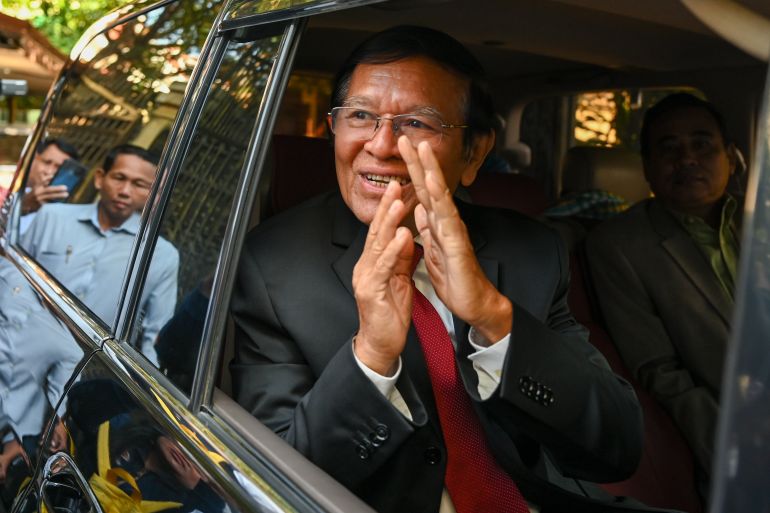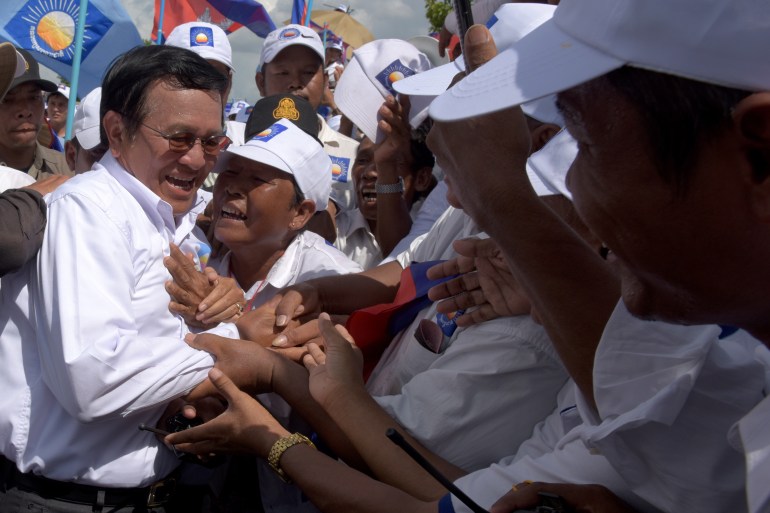Cambodia opposition leader Kem Sokha sentenced to 27 years
The former leader of the now-banned Cambodia National Rescue Party was arrested in 2017 and accused of treason.

Phnom Penh, Cambodia – Cambodian opposition leader Kem Sokha has been sentenced to 27 years under house arrest after being found guilty of treason following a three-year trial in which a judge deemed that his election campaigning and civil society work were designed to encourage a “colour revolution”.
The judge at the Phnom Penh Municipal Court told the former president of the Cambodia National Rescue Party (CNRP) that he would be banned from politics and voting in elections indefinitely. Nor would he be allowed to meet anyone outside his family while under house arrest.
Keep reading
list of 4 itemsCambodia’s Hun Sen shuts down independent media outlet
Photos: Cambodians face eviction to ‘preserve’ Angkor Wat site
Video goes viral after Cambodia tries to silence popular rapper
Kem Sokha was arrested in September 2017 without a warrant in a midnight raid on his home and taken to a provincial jail. Denied bail several times before eventually being released under house arrest, the prominent politician was charged with “conspiracy with a foreign power” under article 443 of Cambodia’s criminal code.
In his decision on Friday, presiding Judge Koy Sao said the court found Kem Sokha guilty of secretly colluding with foreigners to instigate a “colour revolution” in Cambodia under the pretext of campaigning for democratic elections.
The judge said that Kem Sokha was taking ideas from other countries and had used a non-governmental organisation he had founded – the highly-respected Cambodian Center for Human Rights – to further his plans.
“The accused activity is an illegal act that affected the peace, national security, stability and the happiness of the people,” the judge said.
Kem Sokha did not react as his sentence was announced, and he did not take questions from reporters after the verdict, instead he gave a slight smile and raised a fist as he was escorted out of the court’s side door by security guards.
Outside the courtroom, defence lawyer Ang Udom told reporters the verdict was unjust and the case was politicised.
“We all already knew that this is a political case and only the politicians can decide [it],” Ang Udom said, adding he and other lawyers would meet with Kem Sokha later to discuss an appeal.
Condemnation of the verdict was swift.
"The international community should not fall for such a charade. ASEAN and the global community at large should condemn in the strongest terms the travesty of justice inflicted on Kem Sokha, as well as on dozens of other opposition figures…"
— APHR (@ASEANMP) March 3, 2023
United States ambassador to Cambodia, W Patrick Murphy, tweeted that Washington was “deeply troubled” by the conviction.
“[Kem Sokha’s] trial, built on a fabricated conspiracy, was a miscarriage of justice,” Murphy wrote. “Inclusive democracy would further the Cambodian people’s aspirations for a prosperous society that respects all voices and rights.”
Kem Sokha had consistently denied the charges against him, saying he was only trying to win power in Cambodia through the ballot box.
Al Jazeera’s Tony Cheng, reporting from Bangkok, said Kem Sokha’s guilty verdict did not come as a surprise in a trial that had taken three years to complete and involved charges which had seen the opposition leader either held in detention or under house arrest since 2017.
“It seemed very unlikely there was going to be any leniency or certainly any chance of walking out of court today a free man,” Cheng said of the verdict.
“Nonetheless, the 27-year sentence on what, I think most people accept, are very trumped up charges seems very severe,” he said.
“This is effectively a life sentence” for the 69-year-old opposition leader, he added.
Kem Sokha’s popular CNRP was dissolved in 2017 and the government, under longtime ruler and Prime Minister Hun Sen, even made it a crime to associate with the name or depict images of the defunct party and its leaders.
Without any effective opposition, Hun Sen’s Cambodian People’s Party (CPP) swept the board in national elections in 2018.
We are deeply troubled by the conviction of respected leader Kem Sokha. His trial, built on a fabricated conspiracy, was a miscarriage of justice. Inclusive democracy would further the Cambodian people's aspirations for a prosperous society that respects all voices and rights. pic.twitter.com/itrKi9ChLk
— Ambassador W. Patrick Murphy (@USAmbCambodia) March 3, 2023
‘Lack of independence’
When the trial eventually began in January 2020, Kem Sokha was questioned over some 66 hearings about his involvement in politics starting from 1993, his time running a human rights NGO and his ties with Sam Rainsy, another opposition leader who lives in exile in Paris. The two men merged their political groupings to create the CNRP in 2012.
Prosecutors argued Kem Sokha had been caught “red-handed” in a political conspiracy, producing as evidence a two-minute extract from an hourlong speech he made in Australia in 2013 where he said he had had support from the US since 1993.
Government lawyers interpreted opposition members’ actions of raising fists, wearing black or giving out lotus flowers as part of Kem Sokha’s alleged attempt at a colour revolution.
Defence lawyers noted that their opponents kept repeating the argument but failed to show an explicit collusion between Kem Sokha and a foreign government.
As witnesses were questioned in October, the defence again asked why donors from foreign organisations – including the US-based National Democratic Institute whose employees were expelled from Cambodia in 2017 – were not called into the court to explain their alleged association with the defendant.
Government lawyers also attempted to link Kem Sokha to foreign governments by sharing photos of the leader with ambassadors as well as at a garment workers’ protest against low minimum wages in 2014.

Phil Robertson, deputy Asia director at Human Rights Watch, said the verdict demonstrated a “total lack of independence” between the Cambodian judiciary and Hun Sen’s ruling CPP.
“Governments that have sought for decades to promote a rights-respecting Cambodia should use this nonsensical and punitive verdict to reassess their approach to Hun Sen’s government,” he said.
Kem Sokha’s arrest followed the CNRP’s strong performance in local polls in 2017, suggesting it would pose a serious challenge to the CPP in national polls that were scheduled for the following year.
Hun Sen has continued to crack down on the opposition and freedom of expression in recent years with mass trials of opposition politicians and even party members. Last month, he revoked the licence for Voice of Democracy (VOD), one of the country’s last independent media outlets.
The next general elections take place in July.
“This verdict is an unmistakable warning to opposition groups months before national elections,” Amnesty International’s Deputy Regional Director Ming Yu Hah said in a statement. “The use of the courts to hound opponents of Prime Minister Hun Sen knows no limits.
“Sokha is one of many opposition figures who has been put through a physically and psychologically taxing ordeal which will continue after today’s unjust verdict. There can be no right to a fair trial when the courts have been co-opted by the heavy hand of the government.”
Phan Phumint, a former supporter of the CNRP, said he was “shocked” by Kem Sokha’s sentence, but added that the opposition leader would remain popular among Cambodian people.
“People support his past activities and think that he is a nationalist,” he said.
Cambodian political analyst Em Sovannara said the trial and verdict revealed just how constricted Cambodia’s political and civil space had become.
The verdict demonstrated that “the judicial system cannot fulfil the needs of the people”, he added.